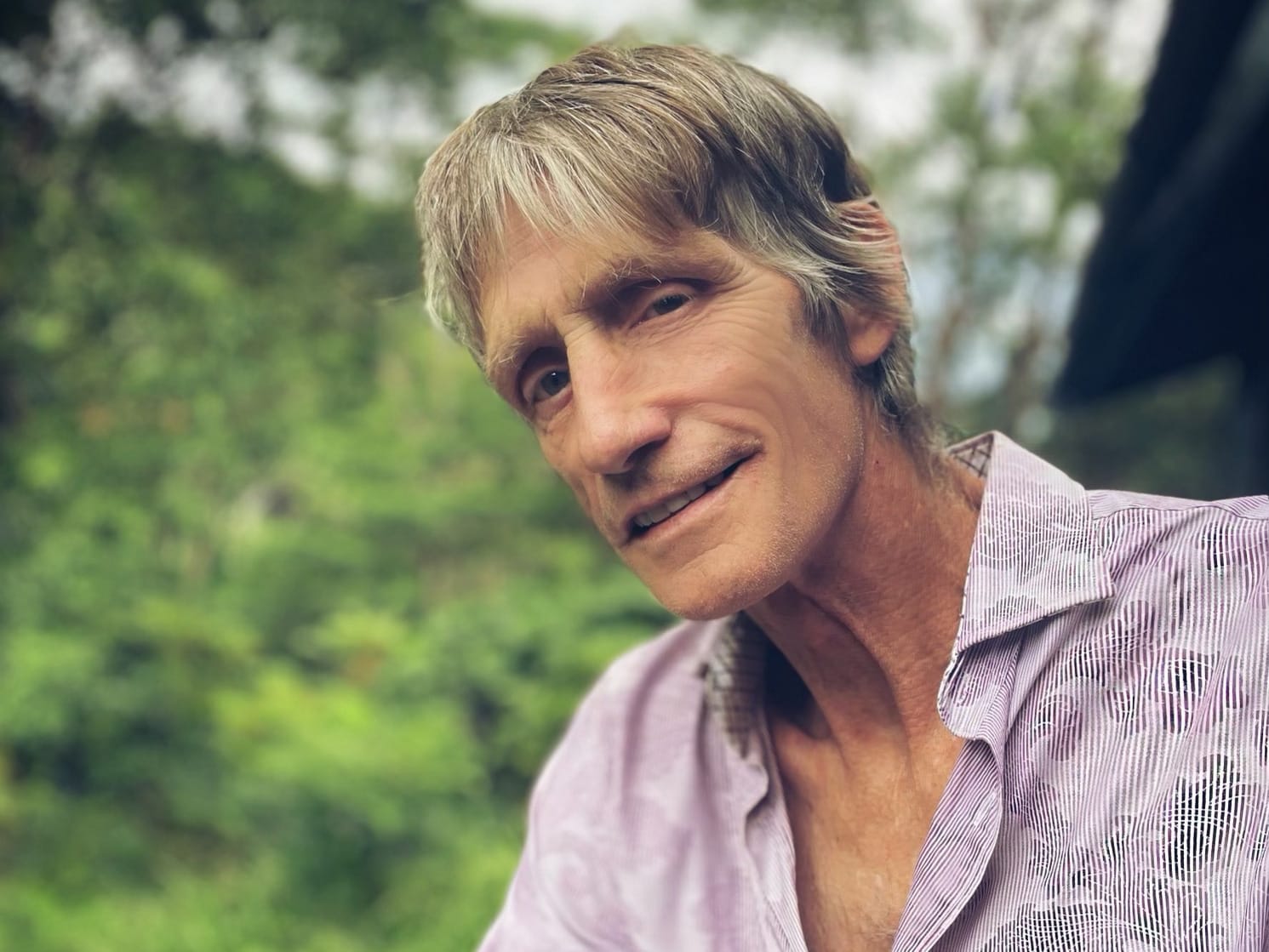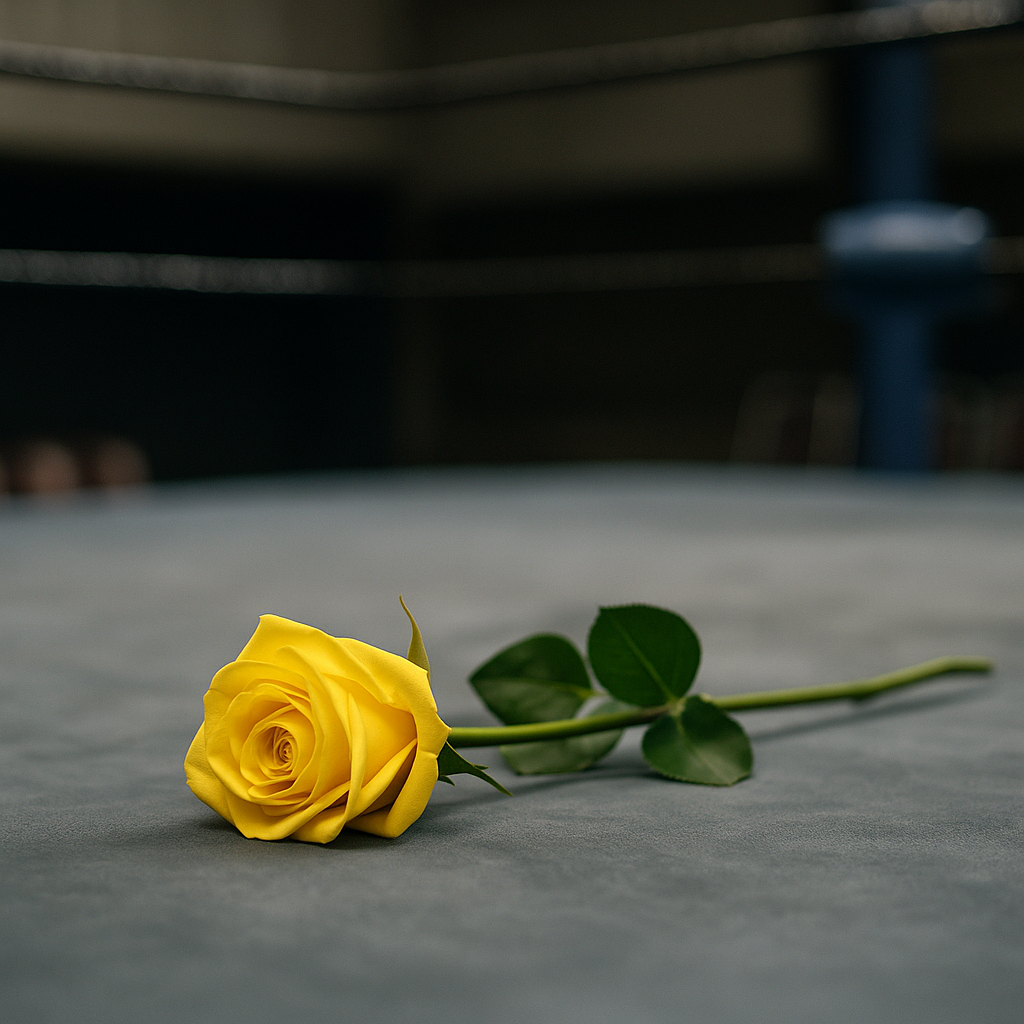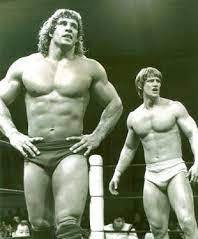The Last of the Von Erichs: A Story of Survival, Faith, and Perseverance
A heartfelt look at Kevin Von Erich—the last surviving brother of the legendary wrestling family—navigating tragedy, faith, and the enduring legacy of the Von Erichs.

Warning: Some readers may find the content of this article triggering due to discussions of mental health, substance abuse, suicide, and family loss.
Saturday mornings were the one time a week my father and I truly bonded when I was a kid. That was when we would watch wrestling together.
My dad emigrated from Portugal in 1967, but he never really learned English. So there wasn't much on TV that he understood. Wrestling, though, was different—you didn’t need to speak English to enjoy it.
It always amused me watching him watch the matches. As the wrestlers pounded each other, he would sit on the edge of his seat and swing his arms as if he were in the ring throwing punches. He'd bob and weave, kick, things I’m pretty sure he wasn’t even aware he was doing.
This was the early 1980s, before cable TV. We had only six channels to choose from – three of them were the national networks: Channel 6 (CBS), 10 (NBC), 12 (ABC). The other three were local stations, which sometimes took some fiddling with the "rabbit ears" antenna to get the picture to come in clear: Channel 56 (which was good for afternoon cartoons), 38 (Red Sox and Bruins games), and 25 (some random programming, like wrestling).
My dad and I watched WWF wrestling every Saturday at 11 a.m. on Channel 56. The WWF, now WWE, shared its initials for years with another organization—the World Wildlife Fund—something nobody seemed to notice at the time.
My Introduction to the Von Erichs
One Saturday morning, I was fiddling around with the antenna, trying to get Channel 25 to come in. That was always the hardest channel to catch—the antenna ears had to be just right.

When the picture cleared, I saw six guys wrestling. I turned up the volume. The announcer had a distinct Southern twang. There couldn't have been more than fifty people in the audience. It was a tiny venue – nothing like the WWF productions, even before Hulkamania began "running wild."
It was a three-on-three match – something I hadn't seen before on the WWF. One team was a group of middle-aged guys with bleach-blond hair and matching dark dyed beards. The announcer referred to them as "The Freebirds." Aside from their hair and beards, nothing about them stood out—they were pretty much cookie-cutter wrestlers with regular physiques.
But my eyes were glued on the other trio. They were young, good looking, athletic guys who clearly had incredible chemistry. The announcer, with his Southern twang, called them the Von Erichs – brothers following in the footsteps of their father, who was their manager and an imposing man in his own right.
One of these Von Erich brothers, Kevin, was wrestling barefoot and he was doing some aerial maneuvers – somersaults, flying crossbodies, dropkicks, jumping off the top rope – that I had never seen before.
Another brother, David, was really tall. I later (by later, I mean this week) found out that he was six-foot-seven. He appeared to be the alpha of the group.
The third brother was the one I was really drawn to. His name was Kerry. At the time I had a crush on a girl in my 5th grade class named Kerry, so I'm sure that was a big part of the allure. I couldn’t take my eyes off him. He was the most incredible physical specimen I’d ever seen—not ridiculously muscular like Arnold Schwarzenegger, but perfectly proportional. A Greek god.
Von Erich Family History
Jack Adkisson was the patriarch of the Von Erich family—a man who led with an iron hand, or as some would say, an iron claw (more on that later). He was an imposing figure, having played offensive lineman in college and signing with the Dallas Texans in 1952. Although he was cut just before the regular season and never played a game in the NFL, his athleticism and presence were undeniable.
At the time, Jack had a newborn at home—Jack Jr., born September 21, 1952—and he chose to give up his dream of professional football to be closer to his family. Back in Texas, he was recruited by a perceptive wrestling promoter and quickly proved to be a natural. Tall, muscular, calculating, and articulate, Jack adopted the persona of a German soldier, capitalizing on the post-World War II sentiment of the era. Along with this new character came a new name: Fritz Von Erich.
Fritz’s wrestling career flourished. He became known for his signature finishing move—the Iron Claw—a deceptively simple yet devastating hold. When the moment was right, Fritz would clamp his massive hand around his opponent’s forehead and squeeze the temples until they had no choice but to wave their arms in submission.
Following the death of Dallas wrestling promoter Ed McLemore in 1966, Fritz Von Erich purchased a controlling interest in Southwest Sports, Inc., taking over the Dallas wrestling territory. He built it into what became the legendary World Class Championship Wrestling (WCCW), a promotion that would launch his family into stardom.
The Von Erich Boys

Fritz Von Erich married Doris Adkisson (née Smith) on June 23, 1950. Remarkably, they had six children— all sons.
- Jack Jr., born in 1952, was the eldest.
- Kevin, the athletic and high-flying brother, followed in 1957.
- David, the tall and charismatic one, was born in 1958.
- Kerry, my favorite, entered the world in 1960.
- Michael arrived in 1964.
- Christopher, the youngest, was born in 1969.
The Beginning of the "Curse"
Spoiler alert: Kevin has been the last surviving Von Erich brother since 1993. Many have referred to the series of tragedies that befell the family as a "curse."
Many call it a “curse,” yet many believe the Von Erich family’s tragedy was driven by a brutal lifestyle, extreme competitiveness, and relentless pressure from their father—factors that pushed the brothers toward self-destruction.
It all began, both innocently and tragically, with six-year-old Jack Jr. He died after accidentally being electrocuted and then drowning in a puddle while playing outside at the family’s trailer park. At the time, Kevin was just a few months shy of his second birthday.
The Von Erich Sons Join the Family Business and Take It to New Heights
All of the Von Erich boys grew up idolizing their father, so it was only natural that they would all choose to enter the family business.
Kevin Von Erich was a standout college football player and nearly went pro, but an ankle injury ended his football dreams. His first professional wrestling match was in 1976.
David Von Erich jumped straight into professional wrestling after high school and quickly became a fan favorite, thanks in part to his trademark cowboy hat and charismatic presence. Known as “The Yellow Rose of Texas,” David’s charm and talent helped him rise rapidly within his father’s promotion.
Kerry Von Erich was a world-class discus thrower with Olympic aspirations, but the 1980 U.S. Olympic boycott dashed his dreams, leading him to follow his brothers into the family wrestling business.
David debuted in 1977, Kerry in 1978.
By the time I was first introduced to the Von Erichs as a 12-year-old in 1982 or ’83, David, Kerry, and Kevin had already established themselves as the heart and soul—and the biggest draw—of their father’s WCCW.
With the rise of cable TV, local wrestling promotions like World Class were suddenly being beamed into living rooms far beyond Texas. The Von Erich brothers, with their athleticism and charisma, were on the verge of leaping off the top rope and into national stardom.
The Yellow Rose

I quickly began to look forward to watching WCCW—and more specifically, the Von Erichs—far more than the boring old guys like Bruno Sammartino and Bob Backlund fighting on WWF. It was no comparison. It seemed like the Von Erichs were feuding with The Freebirds every week. The storylines were captivating. I remember one match where Kerry Von Erich fought one of the Freebirds, and the winner got to shave the loser’s head. I’m sure my mother chastised me that day for sitting so close to the TV.
Up to that point, I hadn't really been exposed to death. Then I tuned in one Saturday to see a somber ceremony going on in the ring. It looked like everyone in the audience— which had grown exponentially since I started watching months earlier—was holding a yellow rose.
It didn't take long for me to piece together that David Von Erich had died – something about a hotel in Japan. They played tribute videos, and I think Fritz may have spoken.
David Von Erich was in Japan wrestling for All Japan Pro Wrestling, hoping to elevate his already soaring career. He died in his Tokyo hotel room at just 25 years old.
There are accounts that David Von Erich was already feeling unwell before departing for his tour in Japan, but—true to the wrestling culture of the era and at his father’s urging—he pressed on, determined to fulfill his commitments.
The official cause of David Von Erich’s death was acute enteritis, a sudden and severe intestinal inflammation that led to a ruptured intestine. While rumors of a possible drug overdose have circulated, his family and close friends have always maintained that his death was due to natural causes—a tragic medical emergency that claimed him far too soon.
His funeral was held in Dallas, Texas, and anywhere between 3,000 and 5,000 people attended. Fans lined the roads during the funeral procession, holding signs and waving, treating him like royalty.
Next Batter Up!
After David’s sudden death, Mike Von Erich was thrust into the spotlight—stepping into the ring more out of family duty than personal ambition. The Von Erichs and WCCW were determined to keep the beloved trio alive for the fans, but the immense pressure to carry on his brother’s legacy weighed heavily on Mike from the very start.
Mike never truly wanted to be a wrestler. Unlike his brothers, Mike was quiet and artistic. He was happier to stay at home and just play his guitar. But after David’s death, fans clamored for another Von Erich to pick up the torch.
Interview with Kerry, David, and Kevin prior to Mike's debut.
I remember the first time seeing Mike—it was an incredible story to see another Von Erich join Kevin and Kerry so they could take on the likes of the Freebirds.
It was obvious, however, that Mike wasn't a natural wrestler. He wasn't as muscular or athletic as Kerry or Kevin. He didn't have their Hollywood looks. He didn't have the skills behind the microphone that a wrestler needs to make it big.
While wrestling in Israel in 1985, Mike injured his shoulder in the ring. The surgery he needed afterward led to a catastrophic case of toxic shock syndrome, a rare infection that nearly killed him and left him forever changed. He returned to the ring after only a few months, but it was obvious his coordination and motor skills were greatly diminished.
The disappointment must have been too much. He felt he was letting his family and fans down. He fell into a severe depression.
On April 12, 1987, at just 23 years old, Mike's body was found in a wooded area near Lewisville Lake, Texas. He had overdosed on tranquilizers and alcohol.
Kevin said in a documentary called, Triumph and Tragedy of World Class Championship Wrestling, "
"With Mike, it was almost like…he didn’t want to be here anymore. He just couldn’t do it. We tried, you know, we loved him, but he was hurting so bad."
Kevin also spoke about how, strangely, he was becoming accustomed to the family tragedies
"After a while, you just go into a kind of survival mode. It hurts, but you just keep going, because you have to."
The Runt of the Family
Chris was the youngest of the Von Erich brothers. He grew up watching the admiration his brothers earned night after night. To him, they were larger-than-life heroes, and he longed to be just like them someday.
The problem was he was five-foot-five and suffered from asthma, among other health problems. But he was determined. He tagged along with his brothers at every event, helping out wherever he could.

Kerry, in particular, took Chris under his wing. He taught him the fundamentals of wrestling and trained with him. When others doubted Chris, Kerry was there to encourage him and boost his confidence.
Fritz was protective of his youngest son and didn’t want Chris wrestling. He knew better than anyone that Chris’s size and health issues—including brittle bones caused by the prolonged heavy usage of medications needed to treat his asthma —made it nearly impossible for him to succeed. Chris’s weakened bones, which made them prone to frequent fractures, were a serious concern – and would prove to be a problem – in the physically demanding world of professional wrestling.
By that time, Fritz had already lost three of his sons, two of those losses linked directly to wrestling. That weighed heavily on him.
Kevin, the eldest brother, was also protective of Chris. He understood what it took to make it in wrestling, and he knew Chris simply wasn’t built for that life. Kevin once said,
"Chris wasn’t built for it, but he had more guts than all of us put together. He just wanted so badly to be out there with us.”
But Chris was undeterred—after all, a heart wants what it wants.
Chris' big break came in June of 1990 when he teamed up with his brother, Kevin, to fight in a tag team (two-on-two) match. It was the realization of a lifelong dream for Chris, who probably appreciated getting in the ring for the first time more than any other of his brothers.
Fritz and Kevin were right, though – Chris wasn't cut out for the grind of the everyday life of a professional wrestler. Grit and determination can only get you so far – and Chris took it as far as it could go.
Physically, injuries held him back. Mentally, the pain of losing two brothers he idolized—David and Mike—left a deep void. Chris wasn’t allowed to hide in the background as the fourth or fifth Von Erich. In his eyes—and maybe everyone else’s—he was expected to step up and live up to the family name.
Ultimately, the pressure became unbearable.
Kevin has spoken with brutal honesty about the day Chris died. He was with Chris at the family ranch on the morning of September 12, 1991, when he noticed his brother looked withdrawn and restless. Kevin has said he felt uneasy but had grown used to seeing Chris like that.
When Chris rode off on his motorcycle, alone. Kevin considered following, but hesitated, thinking his brother just needed space.
Kevin found a brief note Chris had written—a message full of love for his family but also expressing that he couldn’t endure the pain any longer. Kevin recognized the note for what it was, and raced across the vast ranch in search of his baby brother. When Kevin found Chris, it was too late. Kevin held his dying brother in his arms.
Reflecting on that day, Kevin shares the guilt he still carries:
“I think about it every day. If I’d just gone after him… maybe he’d still be here. I’ll never stop wishing I had.”
Then There Were Two: Kerry’s Battle and Tragic End

That left just Kevin and Kerry. Kerry was facing his own demons, though. His once promising career was derailed by a devastating motorcycle accident on June 4, 1986. What few outside the family knew was that Kerry had to have his right foot amputated months later—around October or November of 1986.
Remarkably, Kerry returned to the ring only a few months later, on February 2, 1987. From that point on, he wrestled with a prosthetic foot—something even many of his fellow wrestlers didn’t know.
I only found out a few years ago when watching a documentary on the Von Erichs. You should have seen my reaction. Let's not forget: Kerry was twelve-year-old Tony's favorite wrestler.
Ultimately, Kerry got caught up in the spotlight. He was the rock star of the family—the one everyone expected to rise to greatness. But he was living recklessly and using drugs, a lifestyle that ultimately led to his motorcycle accident, when he crashed at high speed into the back of a stopped police cruiser.
After the accident, Kerry became increasingly dependent on painkillers. The WCCW suffered greatly without the Von Erich brothers headlining events. Seeking a fresh start, Kerry signed with the WWF in 1990, by then a national sensation thanks to Hulk Hogan and promoter Vince McMahon.
With Hogan aging, many believed Kerry was next in line to become the face of the wrestling empire. But McMahon pushed his wrestlers to the limit—often fighting six or more times a week, all over the country. Kerry found it impossible to keep up the pace—literally wrestling on one leg. The pain was unbearable, and his lifestyle was catching up with him.
Eventually, Kerry was released from his WWF contract. Shortly afterward, he was arrested in Denton County, Texas, for possession of painkillers without a prescription. The embarrassment of the arrest would prove to be the final straw.
On February 18, 1993, Kerry was scheduled to appear in court to face charges for violating probation related to his drug possession arrest. According to Kevin, Kerry called him from the family ranch that day. Kevin was immediately worried by Kerry’s tone. He screamed into the phone,
"Don't do this. Don't leave me alone. You're my only brother. Don't leave me."
Kevin called their father right away, urging him to keep a close eye on Kerry. By then, Fritz was a shell of his former self—old age, the loss of four sons, and the collapse of his wrestling empire had taken a heavy toll.
Kevin rushed to the family ranch, but just like with Chris, he arrived too late. He was the first to find Kerry and held his lifeless body in his arms.

Kevin Von Erich and Fritz react to Kerry's death.
The Aftermath
Fritz Von Erich died on September 10, 1997, at the age of 68. It feels like he should have been older, considering all he went through.
Kevin has said in interviews that his father’s passing was, in some ways, a relief.
“He just had too much pain. I think he was ready to go. There was nothing left for him here.”
"He was in such misery, and he was tired. Maybe he’s with them now, at peace.”
Often overlooked in the Von Erich story is Fritz’s wife, Doris. Not only did she lose five sons and a husband, but Kevin shared in a podcast (This Past Weekend w/ Theo) that Doris also lost a younger brother around the time she married Fritz in 1952.
Doris passed away on October 23, 2015, at the age of 82. She spent the last eight years of her life living with Kevin in Hawaii.
After enduring decades of heartbreaking loss, Kevin Von Erich sought peace and healing by moving to Hawaii in 2006. The move offered a refuge far from the intense spotlight and painful memories tied to the family’s Texas ranch.
In the serene surroundings of Kaua'i, Kevin embraced a quieter, simpler life focused on family, nature, and reflection. His wife, Pam, and their four children became a cornerstone of strength, providing unwavering support and love throughout his journey of grief and recovery.
Together, they created a safe space for Kevin to heal, reminding him that while the past carries pain, the present and future still hold meaning and hope. This close-knit family bond was instrumental in helping Kevin rebuild his spirit before eventually returning to Texas to continue the Von Erich legacy on his own terms.
In 2023, after almost two decades of self discovery in Hawaii, Kevin was ready to return to his roots in Texas, purchasing a 70-acre ranch near Boerne, northwest of San Antonio, where he now hosts wrestling events and training camps.
Kevin has four children, and two of his sons, Marshall and Ross, have chosen to follow in the family footsteps as professional wrestlers.
Kerry Von Erich has three beautiful daughters, one of whom—Lacey Von Erich—has also pursued a career in professional wrestling, continuing the family legacy.
Interview with Kerry Von Erich's daughter, Lacey.
The Movie, The Iron Claw
Kevin’s story reentered the public eye in late 2023 with the release of The Iron Claw, a film chronicling the Von Erich family saga. Zac Efron portrays Kevin in the movie, which focuses heavily on the notion of a family “curse.”
Zac Efron played Kevin Von Erich in the movie, The Iron Claw.
However, Kevin has expressed disappointment with the film’s portrayal of Fritz Von Erich as an obsessive, domineering father who pressured his sons excessively and manipulated their careers and lives. The depiction implied that Fritz’s controlling nature contributed to the tragic deaths of his sons.
Incredibly, Kevin was never consulted during the making of the movie and learned about it through social media.
This situation raises questions about how filmmakers use “artistic license” to take liberties with real people’s lives—a practice that doesn’t always feel fair or right.
Kevin has endured the weight of six lifetimes of tragedy. Why should he have to tolerate seeing the man he idolized—his father—portrayed as a villain?
Final Thoughts
Kevin Von Erich’s life has been marked by unimaginable loss and hardship, a series of trials that would test the spirit of even the strongest among us. Much like the biblical figure Job, who faced relentless suffering yet remained steadfast in his faith, Kevin has endured the deaths of five brothers and managed to find respite in the belief of a Higher Power.
In recent years, Kevin has spoken openly about how his newfound religious faith has become a source of comfort and strength—helping him to process grief, find meaning amid pain, and embrace hope where once there was despair. Just as Job questioned and wrestled with his circumstances but ultimately found peace in trust and perseverance, Kevin’s journey reflects a modern testament to enduring faith, resilience, and the belief that one day we will all be reunited in Eternal Paradise.
An excellent news report of his return to Texas in 2023.
📣 Enjoyed this article? Share it:
🐦 Share on Twitter/X
📘 Share on Facebook
💼 Share on LinkedIn
✉️ Share via Email
